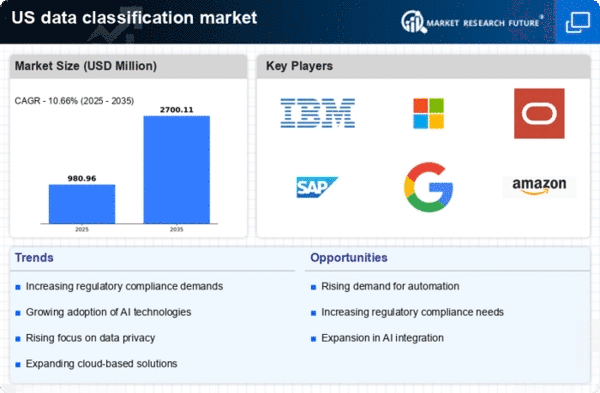Rising Data Volume
The exponential growth of data generated by organizations in the US is a primary driver for the data classification market. As businesses increasingly rely on data for decision-making, the volume of unstructured data continues to rise, necessitating effective classification solutions. According to recent estimates, the data generated in the US is expected to reach 175 zettabytes by 2025. This surge in data volume complicates data management and compliance, thereby propelling the demand for advanced classification tools. Organizations are compelled to implement robust data classification strategies to ensure efficient data retrieval, storage, and compliance with regulations. Consequently, The data classification market is expected to grow significantly as companies aim to harness their data's potential. They must also mitigate risks associated with data mismanagement..
Growing Cybersecurity Threats
The escalating cybersecurity threats faced by organizations in the US are a critical driver for the data classification market. As cyberattacks become more sophisticated, businesses are compelled to implement robust data classification strategies to protect sensitive information. Effective data classification enables organizations to identify and prioritize critical data, ensuring that appropriate security measures are in place. The data classification market is expected to grow as companies invest in solutions that enhance their cybersecurity posture. Additionally, regulatory requirements related to data protection are likely to further drive the adoption of classification tools. This trend indicates that organizations are increasingly viewing data classification not only as a compliance necessity but also as a vital component of their overall cybersecurity strategy.
Increased Focus on Data Privacy
In the current landscape, the heightened emphasis on data privacy is significantly influencing the data classification market. With the implementation of stringent regulations such as the California Consumer Privacy Act (CCPA), organizations are required to classify and manage personal data meticulously. This regulatory environment compels businesses to adopt data classification solutions that ensure compliance and protect consumer information. The data classification market is projected to grow as companies invest in technologies that facilitate the identification and protection of sensitive data. Furthermore, the increasing awareness among consumers regarding their data rights is likely to drive organizations to prioritize data classification as a means of building trust and ensuring transparency. As a result, the data classification market is poised for expansion as businesses navigate the complexities of data privacy.
Demand for Enhanced Data Analytics
The growing demand for enhanced data analytics capabilities is driving the data classification market. Organizations are recognizing the value of data-driven insights for strategic decision-making, which necessitates effective data classification. By classifying data accurately, businesses can improve their analytics processes, leading to better outcomes and competitive advantages. The data classification market is likely to expand as companies seek solutions that facilitate the organization and retrieval of data for analytical purposes. Furthermore, as the complexity of data increases, the need for sophisticated classification tools becomes more pronounced. This trend suggests that organizations are prioritizing data classification as a foundational element of their analytics strategies, thereby fueling growth in the data classification market.
Integration of Advanced Technologies
The integration of advanced technologies, such as artificial intelligence (AI) and machine learning (ML), is transforming the data classification market. These technologies enable organizations to automate the classification process, enhancing efficiency and accuracy. By leveraging AI and ML algorithms, businesses can analyze vast amounts of data and classify it in real-time, thereby reducing the burden on human resources. The data classification market is expected to witness significant growth as organizations increasingly adopt these technologies to streamline their data management processes. Moreover, the ability to classify data dynamically allows companies to respond swiftly to changing regulatory requirements and business needs. This trend indicates a shift towards more intelligent data classification solutions, which could redefine how organizations approach data governance and compliance.

















